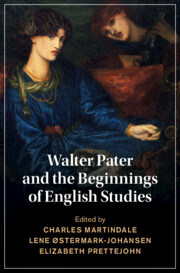77 results
Part I - General
-
- Book:
- Walter Pater and the Beginnings of English Studies
- Published online:
- 14 November 2023
- Print publication:
- 09 November 2023, pp 33-148
-
- Chapter
- Export citation
Introduction to Part II
- from Part II - Individual Authors: Early Moderns, Romantics, Contemporaries
-
- Book:
- Walter Pater and the Beginnings of English Studies
- Published online:
- 14 November 2023
- Print publication:
- 09 November 2023, pp 151-154
-
- Chapter
- Export citation

Walter Pater and the Beginnings of English Studies
-
- Published online:
- 14 November 2023
- Print publication:
- 09 November 2023
Index
-
- Book:
- Walter Pater and the Beginnings of English Studies
- Published online:
- 14 November 2023
- Print publication:
- 09 November 2023, pp 299-306
-
- Chapter
- Export citation
Contents
-
- Book:
- Walter Pater and the Beginnings of English Studies
- Published online:
- 14 November 2023
- Print publication:
- 09 November 2023, pp v-vi
-
- Chapter
- Export citation
Figures
-
- Book:
- Walter Pater and the Beginnings of English Studies
- Published online:
- 14 November 2023
- Print publication:
- 09 November 2023, pp vii-viii
-
- Chapter
- Export citation
Contributors
-
- Book:
- Walter Pater and the Beginnings of English Studies
- Published online:
- 14 November 2023
- Print publication:
- 09 November 2023, pp ix-x
-
- Chapter
- Export citation
Preface
-
- Book:
- Walter Pater and the Beginnings of English Studies
- Published online:
- 14 November 2023
- Print publication:
- 09 November 2023, pp xi-xiv
-
- Chapter
- Export citation
Copyright page
-
- Book:
- Walter Pater and the Beginnings of English Studies
- Published online:
- 14 November 2023
- Print publication:
- 09 November 2023, pp iv-iv
-
- Chapter
- Export citation
Walter Pater and English Studies: A Select Bibliography
-
- Book:
- Walter Pater and the Beginnings of English Studies
- Published online:
- 14 November 2023
- Print publication:
- 09 November 2023, pp 293-298
-
- Chapter
- Export citation
Introduction: Pater and English Literature
-
-
- Book:
- Walter Pater and the Beginnings of English Studies
- Published online:
- 14 November 2023
- Print publication:
- 09 November 2023, pp 1-32
-
- Chapter
- Export citation
Introduction to Part I
- from Part I - General
-
- Book:
- Walter Pater and the Beginnings of English Studies
- Published online:
- 14 November 2023
- Print publication:
- 09 November 2023, pp 35-38
-
- Chapter
- Export citation
Part II - Individual Authors: Early Moderns, Romantics, Contemporaries
-
- Book:
- Walter Pater and the Beginnings of English Studies
- Published online:
- 14 November 2023
- Print publication:
- 09 November 2023, pp 149-285
-
- Chapter
- Export citation
Abbreviations
-
- Book:
- Walter Pater and the Beginnings of English Studies
- Published online:
- 14 November 2023
- Print publication:
- 09 November 2023, pp xv-xvi
-
- Chapter
- Export citation
Contributors
-
- Book:
- The Cambridge Companion to Virgil
- Published online:
- 06 July 2019
- Print publication:
- 18 April 2019, pp xi-xii
-
- Chapter
- Export citation
Index Nominum et Rerum
-
- Book:
- The Cambridge Companion to Virgil
- Published online:
- 06 July 2019
- Print publication:
- 18 April 2019, pp 539-550
-
- Chapter
- Export citation
Copyright page
-
- Book:
- The Cambridge Companion to Virgil
- Published online:
- 06 July 2019
- Print publication:
- 18 April 2019, pp iv-iv
-
- Chapter
- Export citation
Part IV - Themes
-
- Book:
- The Cambridge Companion to Virgil
- Published online:
- 06 July 2019
- Print publication:
- 18 April 2019, pp 343-458
-
- Chapter
- Export citation
Illustrations
-
- Book:
- The Cambridge Companion to Virgil
- Published online:
- 06 July 2019
- Print publication:
- 18 April 2019, pp viii-x
-
- Chapter
- Export citation
Contents
-
- Book:
- The Cambridge Companion to Virgil
- Published online:
- 06 July 2019
- Print publication:
- 18 April 2019, pp v-vii
-
- Chapter
- Export citation



